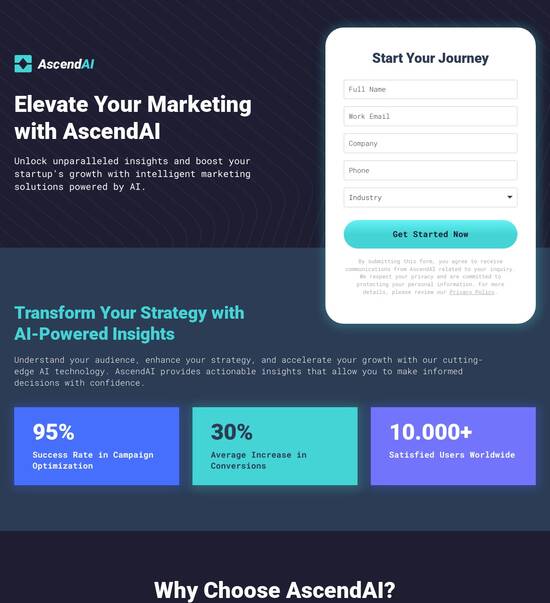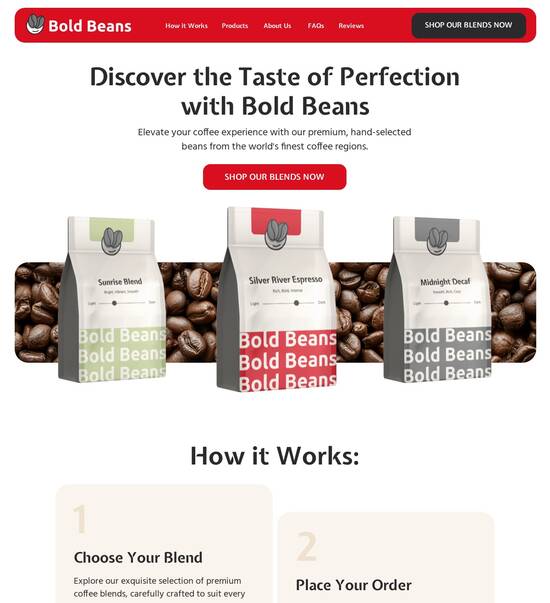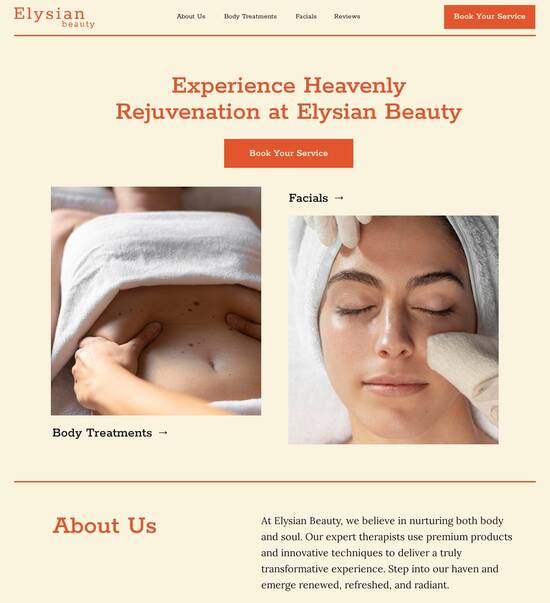
HTML page template for Healthcare assistants
Use TemplateAbout template
Attract clients and showcase your skills with style using our landing page templates for Healthcare assistants. Let's convert those visitors into clients!
Recommended templates

Easy to build without coding
With the intuitive drag-and-drop builder, anyone on your team can create high-converting pages without any knowledge of code or design. Make enhancements to your landing page with custom widgets using Javascript, HTML/CSS, or third-party scripts.

Multiple layouts for any industry and goal
Select from 500+ landing page layouts built to boost conversions across industry-specific scenarios. Customize them by adjusting fonts, adding images, and generating on-brand content with the AI assistant. Quickly scale with Instablocks® and Global Blocks that you can save, reuse, and update globally.

Loads fast and looks polished on any device
Every template is responsive, which means they present professionally on any device and load blazingly fast with our Thor Render Engine. You can also power them up with Google AMP technology to deliver an unparalleled mobile experience and drive higher conversions.

Robust analytics & experimentation
Get real-time updates and reporting across all your devices, showing the number of visitors, conversions, cost-per-visitor, and cost-per-lead. Launch AI-powered experiments, run A/B tests, and use heatmaps to analyze user behavior, then optimize your landing page to maximize conversions.







Easy to build without coding
With the intuitive drag-and-drop builder, anyone on your team can create high-converting pages without any knowledge of code or design. Make enhancements to your landing page with custom widgets using Javascript, HTML/CSS, or third-party scripts.
Multiple layouts for any industry and goal
Select from 500+ landing page layouts built to boost conversions across industry-specific scenarios. Customize them by adjusting fonts, adding images, and generating on-brand content with the AI assistant. Quickly scale with Instablocks® and Global Blocks that you can save, reuse, and update globally.
Loads fast and looks polished on any device
Every template is responsive, which means they present professionally on any device and load blazingly fast with our Thor Render Engine.
Robust analytics & experimentation
Get real-time updates and reporting across all your devices, showing the number of visitors, conversions, cost-per-visitor, and cost-per-lead. Launch AI-powered experiments, run A/B tests, and use heatmaps to analyze user behavior, then optimize your landing page to maximize conversions.
All the features you need to build lead-generating landing pages
Explore more featuresLearn how to build top-performing landing pages for any goal
FAQs
Leading the way in building high-performing landing pages





An <H2> guide for creating high-converting landing pages with Instapage
Creating effective landing pages is essential for maximizing the ROI of your marketing campaigns. Instapage's powerful landing page platform offers marketers the tools to accelerate, optimize, and scale their digital marketing efforts. With its extensive template library and robust optimization features, Instapage empowers users of any budget or team size to create targeted, high-converting pages seamlessly.
An why choose Instapage for landing page creation
Instapage stands out in the crowded field of landing page and conversion rate optimization (CRO) platforms. Its user-friendly design interface allows marketers to swiftly build high-impact pages without the need for coding skills. Moreover, the platform provides an impressive selection of over 100 high-converting templates tailored to various industries, making it easy for marketers in business services, advertising, and education sectors to develop pages that resonate with their audience.
- Diverse Template Options: Instapage offers over 100 conversion-focused templates that cater to various marketing needs, allowing quick and effective launches.
- Built-in Optimization Tools: The platform features robust A/B testing capabilities and heatmaps to help you optimize your landing pages for maximum conversions.
- Collaboration Tools: Instapage facilitates real-time feedback and edits, speeding up the page production process.
- Personalization Features: Dynamic text replacement and AdMaps align your messaging with specific audience segments, ensuring tailored user experiences.
An step 1: selecting the right template
Start by choosing a template that aligns with your campaign's goals. Consider the industries you are targeting, such as tech or financial services, and select a layout that reflects the specific elements that appeal to those demographics. The right template will act as a robust foundation for your messaging and design.
An step 2: customizing your landing page
Once you've selected a template, it's time to customize it. Use Instapage's intuitive drag-and-drop builder to tailor your layout, images, and text. Here are some key aspects to focus on:
- Message Alignment: Ensure that your headline and CTA match the ad messaging to maintain user expectations.
- Visual Appeal: Select high-quality images and maintain brand colors throughout the page for a cohesive look.
- Mobile Optimization: Check that your landing page is responsive and looks great on all devices, as a significant portion of users will access your page via mobile.
An step 3: optimizing for conversion
To ensure that your landing page converts effectively, leverage the optimization features available in Instapage. This step involves testing and analyzing user interactions on your page. Focus on the following:
- A/B Testing: Create variations of your landing page to see which one performs better in terms of conversions.
- Heatmaps: Analyze user behavior on your landing page to identify areas of interest and potential drop-off points.
- Analytics Dashboard: Use the built-in analytics tools to track performance metrics such as bounce rates, conversion rates, and user engagement.
By following these steps, you'll be well on your way to creating a high-converting landing page that maximizes the ROI of your digital campaigns.
Ready to elevate your marketing efforts? Start using Instapage today and see how our landing page and CRO platform can transform your campaigns!
People also ask about HTML page template for Healthcare assistants
HTML page template for healthcare assistants
Understanding the unique needs of healthcare assistants
Healthcare assistants play a crucial role in modern healthcare, directly influencing patient experiences and outcomes. Their responsibilities range from providing basic care to assisting healthcare professionals in more technical procedures. Effective communication is at the core of their duties, allowing them to interact with patients, families, and other healthcare team members. A comprehensive understanding of their unique needs can lead to better resources that enhance their day-to-day operations.
Importance of patient care and support
Skills and responsibilities of healthcare assistants
The need for effective communication in healthcare settings
The role of healthcare assistants goes beyond basic patient care. They often serve as the primary point of contact for patients, addressing concerns and providing emotional support. This foundational aspect of care emphasizes the necessity for resources that facilitate effective communication, allowing healthcare assistants to convey vital information clearly and concisely.
Challenges healthcare assistants face in digital communication
In the realm of digital communication, healthcare assistants encounter several challenges. One significant issue is navigating complex healthcare information, which can often be overwhelming both for assistants and patients. Maintaining patient confidentiality also presents obstacles, as sensitive information must be handled with care across various communication platforms.
Navigating complex healthcare information
Maintaining patient confidentiality
Adapting to various communication platforms
Furthermore, adapting to various communication platforms can be daunting, despite their essential role in enhancing patient care. Understanding how to utilize these platforms effectively can significantly improve interactions with patients and healthcare teams alike.
The benefits of an HTML page template for healthcare assistants
Implementing an HTML page template can greatly enhance the communication capabilities of healthcare assistants. Such templates streamline communication, making it easier to present and share information with patients and their families. By providing clear, structured content, these templates enhance patient comprehension and satisfaction.
Clear and concise presentation of information
Tools for easy accessibility and understanding
Facilitating interaction through forms and contact information
In addition to benefiting patient interactions, HTML templates also facilitate collaboration among healthcare teams. Sharing updates and important information efficiently becomes possible with a structured layout, which can also include integrative features for team notifications and alerts.
Enhanced collaboration with healthcare teams
By providing centralized platforms for documentation and feedback, healthcare assistants can ensure that all relevant information is readily available to their teams. This promotes a seamless flow of communication, ultimately resulting in better patient care.
Key features of HTML page templates tailored for healthcare assistants
HTML page templates designed specifically for healthcare assistants offer numerous key features that improve usability and accessibility. One critical feature is tag functionality, which organizes and structures information in a way that makes it easier for users to navigate.
Utilizing tags for categorizing services and resources
Tagging content to improve searchability
Creating a user-friendly navigation experience
By implementing tags, healthcare assistants can improve the searchability of vital information, leading to a more user-friendly navigation experience. This structural organization plays a crucial role in ensuring that both healthcare professionals and patients can quickly locate the resources they need.
Browser compatibility: ensuring accessibility across devices
Another significant feature is browser compatibility, which ensures that the template is accessible across various devices. As healthcare assistants engage with patients in different environments, being able to access information on tablets, smartphones, or desktops becomes essential.
Importance of responsive design for varied devices
Testing for compatibility across major web browsers
Enhancing user experience in clinics and at home
Finding ways to ensure that all users have a consistent experience, regardless of the platform they are using, significantly enhances the efficacy and reliability of communication.
Incorporating IOLazy for optimized loading times
Another innovative feature that can be utilized within HTML templates is IOLazy loading. This technique is designed to optimize loading times, crucial in maintaining user satisfaction as slow load times can hinder engagement.
Definition and application of IOLazy loading
Benefits of faster page loading for user satisfaction
Reducing bounce rates through improved performance
By reducing the time it takes for pages to load, healthcare assistants can enhance the overall user experience, maintaining engagement and accessibility even on less robust internet connections.
Embedding multimedia: the role of video in patient education
The integration of multimedia elements, especially video, can significantly improve patient education. Videos serve as an engaging medium for conveying complex information in a more digestible format.
Effective use of video to convey information
Strategies for creating engaging video content
Tips for optimizing videos for web use
Creating engaging video content will require careful consideration of the messaging and presentation style. Additionally, optimizing videos for web use ensures that they load quickly and retain viewer interest.
Aesthetic elements that enhance usability
The visual design of an HTML page template is just as important as its functional features. A thoughtfully chosen color scheme can create a calming environment that fosters trust and comfort for patients.
Psychological impact of colors in healthcare settings
Choosing color palettes that promote trust and comfort
Implementing color theory for interactive elements
A well-considered color palette can influence patients' perceptions during their healthcare experience, aligning closely with the values and mission of the healthcare provider.
Font selection: balancing readability and professionalism
Font choice is another critical aesthetic element that can impact user experience. Selecting fonts that enhance readability while maintaining a professional appearance is essential. The right font creates a sense of reliability, reassuring patients while conveying necessary information.
Importance of font choice in conveying reliability
Recommendations for fonts that enhance readability
Styling tips for headers, body text, and calls to action
Using different fonts for headers, body text, and calls to action sets a clear hierarchy in the information displayed. This strategy aids navigation, allowing healthcare assistants to direct patients towards crucial resources effortlessly.
Structural components of effective templates
A well-structured HTML page template is vital for ensuring effective communication flow. Engaging headers and footers play a significant role in impressing users while delivering critical information.
Key elements to include in a professional header
Footer essentials: contact information, links, and resources
Tips for maintaining a cohesive design throughout the page
Incorporating essential elements in both headers and footers ensures that users can find information quickly. Maintaining a cohesive design reflects professionalism and builds patient trust.
Utilizing columns for organized content presentation
Using columns effectively enhances content presentation by improving readability and making it easier to scan for information. Multi-column layouts allow for strategic distribution of information, catering to different preferences.
Advantages of a multi-column layout for readability
Examples of effective column use for information distribution
Best practices for responsive column design
Responsive column designs ensure that information remains accessible and organized regardless of the device used. This approach not only enhances user experience but allows for flexibility in content creation.
Creating a balanced layout: the foundation of user experience
Creating balance within the layout is essential to user experience. Adequate whitespace within the template allows for breathing room around text and images, promoting clarity and focused reading.
Importance of whitespace in design
Strategies for visual hierarchy and flow
Adapting layout to suit different content types
Visual hierarchy guides users through the information presented, ensuring that essential details are highlighted effectively. Adapting layouts for various content types further enriches the communication process.
Content creation: crafting meaningful and accessible information
Creating content that resonates with patients and families is paramount for effective communication. Writing empathetic and informative content enhances the relationship between healthcare assistants and their patients.
Tips for writing empathetic and informative content
Importance of incorporating patient stories and testimonials
Utilizing FAQs to address common concerns
Utilizing patient stories and testimonials creates a more relatable narrative, allowing readers to see themselves in the experiences shared. Including Frequently Asked Questions further addresses common concerns, making the content comprehensive and accessible.
Strategic use of imagery: visuals that communicate care
Visual content plays a critical role in conveying information effectively. Selecting appropriate and inclusive images helps in fostering an environment of trust and understanding.
Selecting appropriate and inclusive images
Alt text and accessibility considerations
Balancing images with textual content for maximum impact
Incorporating alt text ensures that the content is accessible to all users, including those with disabilities. Striking a balance between text and imagery allows healthcare assistants to communicate effectively, emphasizing the supportive role of their profession.
Troubleshooting common problems in HTML template implementation
Despite the advantages of an HTML page template, common problems in implementation can arise. Ensuring a positive user experience is vital, as poor design or functionality can hinder the effectiveness of the resources provided.
Common pitfalls in healthcare website design
Analyzing user feedback for continuous improvement
A/B testing for optimized content delivery
Analyzing user feedback is essential for continuous improvement, allowing healthcare assistants to refine the content and layout based on real experiences. Employing A/B testing provides insights into which components are most effective, facilitating data-driven adjustments.
Ensuring compliance with healthcare regulations
Understanding and adhering to healthcare regulations, such as HIPAA, is paramount in maintaining patient privacy online. Designing templates with compliance in mind creates an environment of trust and security for patients.
Understanding HIPAA and patient privacy online
Designing templates with compliance in mind
Importance of ongoing training for staff
Ongoing staff training is essential to ensure that all team members are aware of regulatory changes and their implications, fostering a culture of compliance and security within the organization.
Empowering healthcare assistants with essential tools
HTML templates come with additional features that can empower healthcare assistants in their roles. One such feature is a resource download panel, which centralizes access to essential materials for both patients and assistants.
Creating a resource library for patients and families
Best practices for organizing downloadable materials
Utilizing forms for feedback and resource requests
A well-organized resource library not only simplifies access to materials but also enhances patient education, providing them with the tools they need to manage their health effectively.
Utilizing an HTML builder for customization
Employing an HTML builder allows healthcare assistants to customize templates according to their specific needs. A user-friendly HTML builder simplifies the page-creation process, enabling assistants to focus on delivering quality care.
Overview of user-friendly HTML builders on the market
Features to look for in an HTML builder for healthcare
Importance of customization to meet specific needs
When selecting an HTML builder, healthcare assistants should look for features that support easy customization and integration of various tools, allowing for flexibility in their everyday tasks and communication.
Ready to skyrocket conversions?
Supercharge your ad campaigns with high-performing landing pages
Get started














